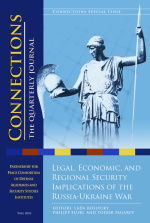Since the collapse of the Soviet Union and the end of the Cold War, military tensions in Europe have significantly decreased. However, the rapid evolution of weapon systems, warfare formats, and geopolitical trends of regional and global players in the international arena have led to increased demand for arms, rising military expenditures, and military escalations. In response to Russia’s armed aggression, Ukraine has begun the process of building up its military power, which, in turn, has caused an economic shock. This article aims to highlight the current trends in militarization and economic growth and analyze the military power and economic indicators of Ukraine, some NATO member states, and Russia. The study’s subject is the indicators of several states’ military and economic capabilities. The study was conducted using empirical research, analysis and synthesis, and formulation of assumptions. The article examines the problematic issues of Ukraine’s economic growth and military capability, focusing on the period leading up to the full-scale war. The study covers a set of fundamental events in Ukraine’s historical paradigm. It identifies trends in establishing close diplomatic relations between Ukraine and Western countries. At the same time, the work reveals the importance of transforming the state’s military and economic capabilities.
Reviewed article
Military-Economic Capabilities of Ukraine During the Transformation
Article statistics
Bibliography
Bastian Herre et al., “War and Peace,” Our World in Data, 2024, https://ourworldindata.org/war-and-peace
“Deaths in Armed Conflicts by Region,” Our World in Data, https://ourworldindata.org/grapher/deaths-in-armed-conflicts-by-region
John Torpey, “Pinker and Progress,” Theory and Society 47, no. 4 (2018): 511-538, https://doi.org/10.1007/s11186-018-9320-z
Joshua S. Goldstein, Winning the War on War: The Decline of Armed Conflict Worldwide (Penguin Publishing Group, 2012).
Therése Pettersson and Peter Wallensteen, “Armed Conflicts, 1946–2014,” Journal of Peace Research 52, no. 4 (2015): 536-550, https://doi.org/10.1177/0022343315595927
Uppsala Conflict Data Program (UCDP), “Number of Deaths,” https://ucdp.uu.se/country/369
Michael C. Desch, “Democracy and Victory: Why Regime Type Hardly Matters,” International Security 27, no. 2 (2002): 5-47, https://doi.org/10.1162/016228802760987815
“2023 Military Strength Ranking,” accessed November 28, 2023, https://www.globalfirepower.com/countries-listing.php
Mickaël Andrieu, “Global Fire Power Ranking 2022: The List of Countries and Their Fire Power Index,” Kaggle, accessed November 28, 2023, https://www.kaggle.com/datasets/mickaelandrieu/global-fire-power-ranking-2022
Suleiman Abu-Bader and Aamer S. Abu-Qarn, “Government Expenditures, Military Spending and Economic Growth: Causality Evidence from Egypt, Israel, and Syria,” Journal of Policy Modeling 25, no. 6-7 (September 2003): 567-583, https://doi.org/10.1016/S0161-8938(03)00057-7
N. Gregory Mankiw, David Romer, and David N. Weil, “A Contribution to the Empirics of Economic Growth,” The Quarterly Journal of Economics 107, no. 2 (May 1992): 407-437, https://doi.org/10.2307/2118477
Jeffrey Kopstein and David A. Reilly, “Geographic Diffusion and the Transformation of the Postcommunist World,” World Politics 53, no. 1 (October 2000): 1-37, https://doi.org/10.1017/S0043887100009369
“World Bank Open Data: Free and Open Access to Global Development Data,” The World Bank, accessed November 2, 2023, https://data.worldbank.org
Lucan A. Way, Interview with Mircea Snegur, Chisinau, Moldova, February 8, 2002.
Lucan A. Way, “Authoritarian State Building and the Sources of Regime Competitiveness in the Fourth Wave: The Cases of Belarus, Moldova, Russia, and Ukraine,” World Politics 57, no. 2 (January 2005): 231-261, https://doi.org/10.1353/wp.2005.0018
Steven Levitsky and Lucan A. Way, “Linkage versus Leverage. Rethinking the International Dimension of Regime Change,” Comparative Politics 38, no. 4 (July 2006): 379-400, https://doi.org/10.2307/20434008
European Commission, “Key Findings of the 2023 Report on Ukraine,” November 8, 2023, accessed January 11, 2024, https://ec.europa.eu/commission/presscorner/detail/en/QANDA_23_5631
“Attitudes of Citizens to the Main Directions of Ukraine’s Foreign Policy,” Analytical Note (National Institute for Strategic Studies, March 25, 2010), http://niss.gov.ua/doslidzhennya/mizhnarodni-vidnosini/stavlennya-gromadyan-do-osnovnikh-napryamiv-zovnishnoi-politiki
Todor Tagarev, Lada Roslycky, and Philipp Fluri, “Putin’s Last War: Narratives, Counternarratives, and Early Lessons Learned,” Connections: The Quarterly Journal 21, no. 3 (2022): 5-8, https://doi.org/10.11610/Connections.21.3.00
Philipp Fluri and Leonid Polyakov, “Intelligence and Security Services Reform and Oversight in Ukraine – An Interim Report.,” Connections: The Quarterly Journal 20, no. 1 (2021): 51-59, https://doi.org/10.11610/Connections.20.1.03
“World Corruption Perceptions Index – 2022,” Transparency International – Ukraine, October 11, 2023, https://cpi.ti-ukraine.org/en/
Jolyon Howorth, Security and Defence Policy in the European Union, The European Union Series 61 (London: Palgrave Macmillan, 2014).
The Military Balance 2021 (London: International Institute for Strategic Studies, 2021).
Stockholm International Peace Research Institute (SIPRI), SIPRI Yearbook 2015: Armaments, Disarmament and International Security (SIPRI, 2015), accessed January 9, 2024, https://www.sipri.org/yearbook/2015
SIPRI, SIPRI Yearbook 2016: Armaments, Disarmament and International Security (SIPRI, 2016), accessed January 9, 2024, https://www.sipri.org/yearbook/2016
Magdalena Grono, “Mirror Images: The Standoff between Moscow and Western Capitals,” International Crisis Group, May 4, 2018, https://www.crisisgroup.org/europe-central-asia/western-europemediterranean/mirror-images-standoff-between-moscow-and-western-capitals
James Sherr, Hard Diplomacy and Soft Coercion: Russia’s Influence Abroad (Brookings Institution Press, 2013).
Julian Cooper, “Russian Military Expenditure in 2016 and 2017, Arms Procurement and Prospects for 2018 and Beyond,” Changing Character of War Centre (University of Oxford), 2018.
Julian Cooper, “Russian Military Expenditure in 2017 and 2018, Arms Procurement and Prospects for 2019 and Beyond,” Changing Character of War Centre (University of Oxford), 2019, www.ccw.ox.ac.uk/blog/2019/2/11/russian-military-expenditure-in-2017-and-2018-arms-procurement-and-prospects-for-2019-and-beyon…
Bettina Renz, “Russian Military Reform: Prospects and Problems,” The RUSI Journal 155, no. 1 (2010): 58-62, https://doi.org/10.1080/03071841003683476
Julian Cooper, “The Russian Budgetary Process and Defence: Finding the ‘Golden Mean,’” Post-Communist Economies 29, no. 4 (2017): 476-90, https://doi.org/10.1080/14631377.2
017.1333793
Tania Yazbeck, “The Russian Economy and Resources Available for Military Reform and Equipment Modernization,” TM 2010-192 (Defence R&D Canada, Centre for Operational Research and Analysis, September 2010), https://cradpdf.drdc-rddc.gc.ca/PDFS/unc103/p534204_A1b.pdf
Vasily Zatsepin, “Russian Military Expenditure: What’s Behind the Curtain?” The Economics of Peace and Security Journal 2, no. 1 (2007): 51-61, https://doi.org/10.15355/2.1.51
Ministry of Finance, “GDP per Capita in Ukraine,” accessed October 10, 2023, https://index.minfin.com.ua/ua/economy/gdp/
Ministry of Defence of Ukraine, “Implementation of the State Budget by the Ministry of Defence of Ukraine,” accessed October 10, 2023, https://www.mil.gov.ua/diyalnist/byudzhet-ta-vikonannya-czilovix-program/vikonannya-ministerstvom-oboroni-ukraini-derzhavnogo-byudzhetu/
Keith Darden and Anna Maria Grzymała-Busse, “The Great Divide: Literacy, Nationalism, and the Communist Collapse,” World Politics 59, no. 1 (2006): 83-115, https://doi.org/10.1353/wp.2007.0015
Nassim Nicholas Taleb, Antifragile. Things That Gain from Disorder (NY: Random House, 2012).

